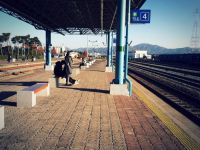Andong-si is located in north central region of Gyeongsangbuk-do, Korea. There was Andongdae local metropolitan government in the Goryeo and Joseon dynasty. It is famous for Confucian culture. Its slogan is “Andong, the capital of Korean moral culture”. There are famous tourist attractions like Hahoe Village and Dosanseowon Confucian Academy. Many cultural properties have been preserved. The city hall is located in Myeongnyun-dong, and the administrative district consists of 1 eup 13 myeon 10 dong. The area is 1,520 ㎢, 2.5 times larger than Seoul, and it is the biggest administrative district in Korea. The Province of Kyoungsangbuk-do is supposed to move to Pungcheon-myeon in July, 2015. (Data source : Wikipedia)
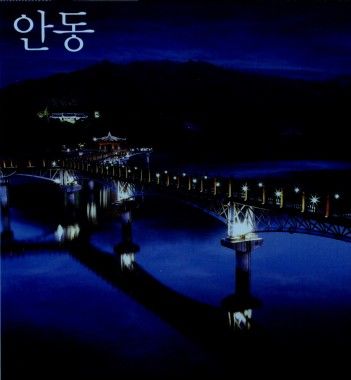
Andong, the capital of Korean moral culture
It is the repository of Korean Confucianism culture, which has many head houses of yangban(Korean aristocrat) and memorial halls for Confucianist services. Its area is 2.5 times larger than Seoul, and it is the hugest region in Gyeongsangbuk-do. Andong soju, Andong sanyak, Andong salted mackerel and Andong jerky are specialties. The woods and fields form 71 percent of the whole region, and its main industry is agriculture.
Andong-si has become the center of Korean moral culture by promoting Andong International Mask Dance Festival, and programs like traditional etiquette school and classical scholar culture experience. It has informed the excellence of Korean traditional culture by joining world's historical city following Gyeongju.
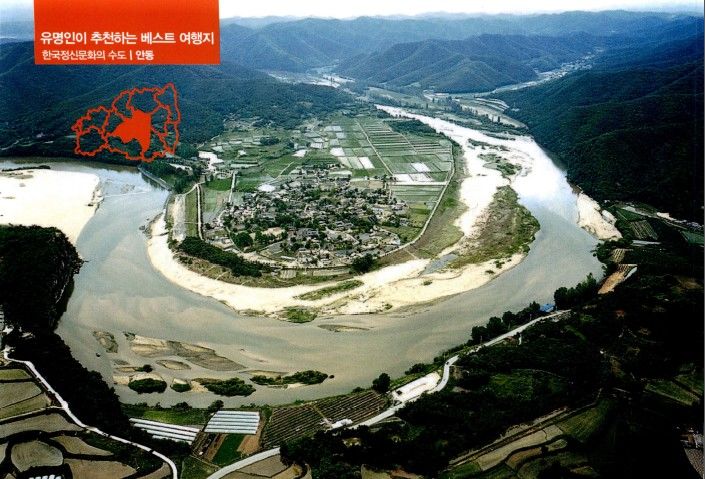
Hahoe Village, which has been listed on world heritage
Hahoe village is famous for yangban village, but it is more energetic when it satirizes solemn traditions of Confucianism. The proverb says, “the base of Huh, the door of An and backboard of Ryu.”
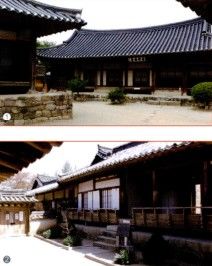
1. Bookchondaek
2. Chunghyodang

Ryu Si-won/ actor and singer
Born in 1972 in Andong
Private ambassador for welcoming Queen Elizabeth in April, 1999
Appear in famous TV dramas like “feeling”, “blue sky” (KBS) and “happiness in our mind”, “beautiful days” (SBS)
-Writer Ryu Si-won-
Nakdonggang river flows around Hahoe village that resembles lotus floating over the water. Hahoe village was listed on world heritage in August 2010 as it preserved folk culture and architectures.
You can see beautiful landscape of Hahoe village in Buyongdae where classical scholars lived in free and easy retirement. In Buyongdae, soaring beyond northwest river, you can see Hahoe village is embracing blue water of Nakdonggang river and silver sandy beach.
The geographical feature of Hahoe village is called “taegeuk symbol” or “Yeonhwabusu symbol”. It is not because stream of Nakdonggang river flows S-shaped. “Whasan”, the vein of the Taebaek mountains, stretches to the center of the village. Buyongdae, the vein of bohyun mountain, puts up a screen around the village. It is certain that Hahoe village is excellent place in the theory of divination based on topography.
The village remains intact even after Japanese Invasion of Korea in 1592 which was the biggest historical event in the Joseon Dynasty period. It is famous yangban village that has produced a number of high government official including Yu Seong-ryong.
Between the big road crossing Hahoe village, the northern village and the southern village face each other. Yangjindang, Bookchondaek of the northern village and Chunghyodang, Namchondaek of the southern village are typical Yanggin houses in regard of historical value and the scale. The Ryu family live in the center of the village, and other families live in the surburb. So two cultures coexist. Many houses of Hahoe village such as Yangjindang(No. 306 national treasure), Chunghyodang(No. 414 national treasure), Bookchondaek(No.84 important folklore material) have been listed on national treasure or important folklore material. In particular, the 22nd daughter-in-law has managed housekeeping of the Ryu family in Yangjindang. And Chunghyodang, which is the well-known head family house of Yu Seong-ryong, has kept alive.
Across Chunghyodang, there is Damyeonjae that is my home town house. It has special meaning. Many people remember that Queen Elizabeth received congratulations for her 72nd birthday and watched Hahoe byeolsingut talnori in the grassy field in front of Damyeonjae.
Hahoe village is famous for yangban village, but it is more energetic when it satirizes solemn traditions of Confucianism. The proverb says, “the base of Huh, the door of An and backboard of Ryu.” The family who prepared the ground for Hahoe village was neither the Ryu family nor the An family. It was the Huh family. One unmarried young man of the Huh family made Hahoe mask for the first time. So people could express their anger against caste system of Confucian society with the masks of butcher, monk, bride and aristocrat.
Hahoe byeolsingut talnori is being played in Samsindang in the middle of the village. It is mental resting area for many people. It looks like the actors of Hahoe byeolsingut talnori would jump out from the corner of the street.
As watching antique houses beyond stone wall, I feel like as if I went back to hundreds years ago. Under the name of “modern”, many old things have been neglected. Even so, some people have made an attempt to protect moral culture of Korea. The body is useless without the mind. Why don't you review Confucian values of predecessors in the middle of Hahoe village?
-Recommendation remains of Andong-
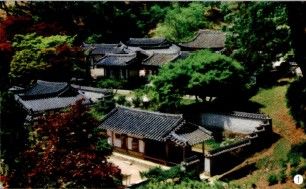
Dosanseowon Confucian Academy
Dense forest with large pine trees. Dosanseowon confucian academy is located at the foot of a mountain where blue water of Nakdonggang river winds through. It has respected Teogye Lee Hwang, the great scholar of Neo-Confucianism. After leaving government service, Lee Hwang devoted himself to his studies with his disciples. They built confucian academy after Lee Hwang had passed away. King Sunjo named “Dosanseowon”. Hanseokppong wrote the signboard.
There are many places to look around in Seowon like Dosan seodang, Nongun jeongsa, Gwangmyeongsil and Jeongyodang. Teogye Lee Hwang made monk Beomnyeon establish Dosan seodang. It is gable roofed building, which consists of kitchen, ondolbang and toenmaru. It has small garden, pond and study room. Jeongyodang was established in 1574. It is Octagonal roofed, and it has ondolbang and the main floored room. Even though it is not splendid, it is imperative. It is good to look around Sisadan and Jangpangak.
Address: Togye-ri 680, Dosan-myeon, Andong-si, Gyeongsangbuk-do
Contact information: 054-856-1073
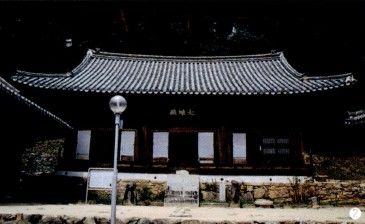
Bongjeongsa Temple
While climbing Cheondeungsan mountain along small road, you can see a beautiful temple at the foot of a mountain. That is Bongjeongsa temple. It was built by Neungin Daedeok, the disciple of Uisangdaesa, in 672. And it was repaired in 1363. Some people say Uisangdaesa flew paper phoenix in Buseoksa temple, and it settled here. So he established a temple, and named it “Bongjeongsa temple”.
Bongjeongsa temple has a long history, so Queen Elizabeth visited here in 1999. It has treasure architectures like Geungnakjeon Hall, Daeungjeon Hall, Whaumgangdang and Gogeumdang. Moreover, it consists of Muryanghaehoe, Manseru, Uhwaru and Yosachae.
Geungnakjeon Hall, which is the oldest wooden building in Korea, was built on the stylobate. It is gable roofed, and made with Jusimpo style. It was built in the Goryo dynasty period, but it has architecture style of the period of united Silla. So it is more valuable. Yeongsanam, which is 200 meters far from here, is the filming site of “What is the Reason Why Bodhidharma Went to the East?”
Address: Taejang-ri 901, Seohu-myeon, Andong-si, Gyeongsangbuk-do
Contact information: 054-853-4181
-History tour with children-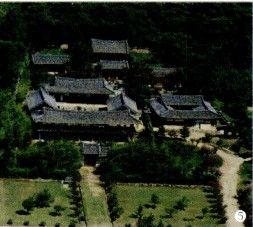
Byeongsanseowon Confucian Academy
In Andong, which produced a number of renowned Confucian scholars in the Joseon dynasty period, there are many historic sites where you can feel the Confucian culture and academic traditions. Among them, Byeongsanseowon confucian academy is indispensable.
Byeongsanseowon confucian academy was built in order to hold a memorial service for Yu Seong-ryong, and cherish his virtue and study. It is representative Confucian architecture of the Joseon dynasty period. After Yu Seong-ryong had passed away, his disciples and local scholars established Jondeokssa temple in 1613 and kept his tablet in the shrine. It was named “Byeongsan” in 1863, so it became Saaek Seowon. It is one of 47 Seowons which remain intact in spite of abolition policy by Heungseon Daewongun.
There are Jondeokssa temple and Ipkkyodang that keep the tablets of Yu Seong-ryong and his third son. 1,000 reference books including his collection of works, and 3,000 books are housed in seodang. Ipkkyodang was the class, and it consists of three rooms. There are Myongsungje in the east and Gyeonguije in the west.
There are Jangpangak which keeps woodblock, Hongjae and Seojae that were dormitory for students of Confucianism and Mandaeru which was an auditorium.
Address: Byeongsan-ri 30, Pungcheon-myeon, Andong-si, Gyeongsangbuk-do
Contact information: 054-858-5929
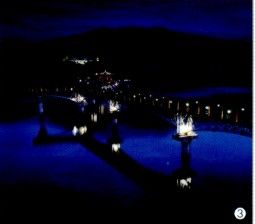
Woryeonggyo
Many people turn their head to Woryeonggyo, the beautiful wooden bridge harmonized with
Andong Dam. It is the longest wooden bridge in Korea. It praises the beautiful and noble love of Ieungtae and his wife. One letter found in the tomb of Ieungtae 450 years before attracted attention of many people. The letter and a pair of hemp-cord sandals show their ardent love. Woryeonggyo is the bridge of love for many couples.
Address: Sanga-dong, Andong-si, Gyeongsangbuk-do
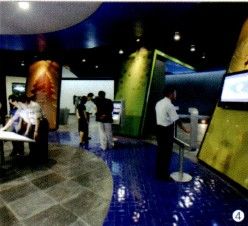
Traditional cultural contents museum
It is the first museum without relics and advanced digital museum. It is total 1,700 m2. It consists of 4D theater, the first exhibition hall, the second exhibition hall, reference room and
museum storage.
Address: Dongbu-dong 447-8, Andong-si, Gyeongsangbuk-do
Contact information: 054-843-7900
-Eco-friendly well being journey-
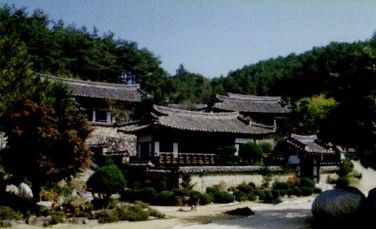
Old house experience
Andong has long traditional culture and antique old houses. So it is the best place to learn traditional etiquette of Korea. Andong elementary school, Suaedang, Jirye artist town, Toigye head house, Nongam head house, Ocheongunjari, Tapdong head house and Imcheonggak estate buildings are popular. You can learn Korean tea ceremony, melody and folk game in addition to traditional etiquette.
You must visit Suaedang at first. It is in the way from Andong to Yeongdeok. You can enjoy various folk games like Neolttwigi, hoop, rice-flour mill, and events like Korean paper art, talchum and dyeing with loess.
You can find typical traditional jaerye of Andong in Jirye artist town where many artists like writers, painters and composers, and foreigners have visited. You can also experience making doenjang, dasik and rice cake.
You must also visit Nongam head house that has 600 years of tradition. There are beautiful pine trees around Nakdonggang river, which makes peaceful atmosphere. You can feel academic traditions of instructor Nongam who pursued Gangrogirak(江湖之樂). There are Doseon confucian academy, Toigye head house, studies advancement center, Dosan hot spring and Yi Yuk-sa literary house nearby.
Gyemyeongsan Mountain Recreational Forest
Gyemyeongsan mountain recreational forest, which is located in deep forest with clean water and mysterious pine and oak trees, is chemical free region. Houses made of tall larch, wildflowers are gathered exquisitely. It is the best place to cultivate one's body and mind.
Moreover, it has wonderful scenery as it overlooks the foot of Gyemyeongsan mountain and blue water of Girancheon. Since there is cool water in the valley, it is good to enjoy swimming.
Gyemyeongsan mountain recreational forest is equipped with forest recreation room, Hwangtobang, kitchen, pavilion, shower room, outdoor deck and forest house. It also has amenities like forest class, pool, adventure play facilities, playground, trail, so it is the best place for families and teenagers. Moreover, you can take a tour as there are Girancheon, Cheongi gapsan, Yonggye ginkgo tree, Jirye artist town, Imha dam, Andong dam, Doseon seowon, Bongjeongsa temple and Hahoe village.
Address: Goran-ri mountain 1-1, Giran-myeon, Andong-si, Gyeongsangbuk-do
Contact information: 054-822-6920
-Walking tour with story-
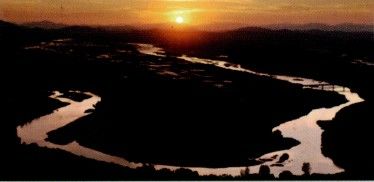
Toigye Path(Yedeongil)
You can see picturesque landscape while walking Toigye path. Teogye Lee Hwang(1501-1570) called it as “the path into the picture.” Young Toigye walked the river-side path of Nakdonggang river in order to learn study from his uncle Yiwu.
Toigye walked along the path from his placenta chamber to Cheongnyangsan mountain to learn writing. He strolled here to appreciate Cheongnyangsan mountain. He strolled about fifty-ri. But Toigye path is about five kilometers from Gasong-ri rafting, Nongam head house to observatory. In Nongam head house, which is the middle of the course, you can experience old house. The course around Guernseysan is not steep.
Trail Outline
Gyeosol Culture and Eco Trail (5km)
-Gasong-ri rafting→ Nongam head house→ Small spring(Palgakcheong)→ Guernseysan mountain→ Observatory(destination)→ Gasong-ri Danhogyo bridge
Contact information of the department of green environment, Andong city hall: 054-840-6184
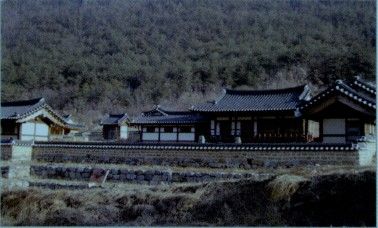
Andong Confucianism Culture Trail
It is 38.8km road covering historic site of Andong where various lives of classical scholars and ordinary people coexist. You can feel the dignity of yangban culture of the north Gyeongsangbuk-do in the whole area of Hahoe village and Byeongsanseowon confucian academy.
This road consists of pavilion, seowon, head house and beautiful woodland path. It is divided into three courses. The foundation stone, the pillar and building disposition are well matched with the nature. The legends about classical scholar and wise mother have been passed down. The legends and tales about devoted son, brothers with good relationship, mountain god and goblin have been mixed.
Trail Outline
The first course”Pungsan deunggil”(14.3km 3hours~4.5hours)
-Nagamjeong→ Eco Experience Center→ Nakkangjeong→ Danhogyo→ Maaeseonsa remains gallery→ Chimnyujeong→ yean lee head house→ Chehwajeong→ Andong hanji gallery
The second “Hahoe village road”(13.7km, 3hours~4hours)
-Andong hanji gallery→ Byeongsanseowon Confucian Academy→ Hahoe Village→ Yeonhwa Samgeori(you can go with raft from Hahoe Village to Hwacheon Seowon<3 course>)
The third course “Gudamseupjigil” (10.6km, 2.5 hours~3.5 hours)
-Hyeonoe→ Nakkosa→ Hwacheon Seowon→ Buyongdae→ Gyeogamjeong→ Seommaeul→ Gudamgyo
The department of traditional industry of Andong: 054-840-5817
Andong culture keeper: 054-856-170









